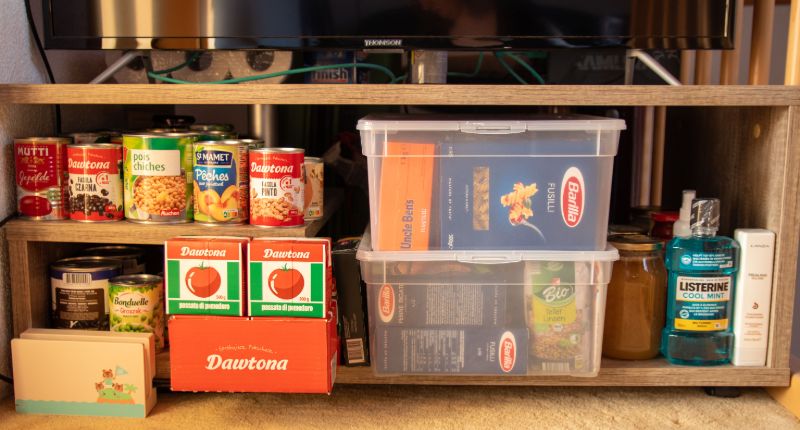Hyperinflation isn’t an event that happens so rarely that it might as well be something out of a fiction novel. It has already happened a lot of times before in even the most civilized places. Learn how to prepare for hyperinflation and protect your family from financial woes by following the steps above.
RELATED: Economic Collapse: All Signs Point South?
How to Prepare for Hyperinflation | 7 Easy-to-Follow Tips for Surviving Run-Away Inflation

1. Eliminate Debt

Personal debt is always a problem, especially during periods of hyperinflation. This is because you are paying not only for the actual cost of whatever it is you purchased but also interest.
Moreover, you are putting your properties at risk of foreclosure, seizure, or repossession should you be rendered incapable of paying. During periods of hyperinflation, this is a scenario that is extremely likely to happen as savings are devalued and jobs are lost.
As much as possible, try to get rid of debt early. Prioritize those that have adjustable interest rates.
The interest rate on these flex-rate or variable loans, credit card debts, mortgages, and the like will most likely go up when hyperinflation happens. This puts an even bigger strain on a family’s budget, especially one that is already strapped to cover even the most basic necessities.
Eliminating debt doesn’t just give you peace of mind. It also frees some of your money so you can start investing in things that will protect you from a possible crisis.
2. Establish Multiple Sources of Income

Mass unemployment is another common effect of run-away inflation. As such, having job security should be one of your priorities when learning how to prepare for hyperinflation.
Do this by diversifying your income stream. Have more than one source of income, even if it is just a side-gig or a part-time job.
You can take advantage of the internet as there are now tons of opportunities for you to make money online. You can choose to start a small online business or leverage your skills for freelance opportunities like tutoring, helping create content, social media management, and many more.
There are even ways to set up passive income streams from a variety of websites through affiliate advertising networks and similar ventures.
Start establishing these sources of income as early as possible. Do not wait for the effects of hyperinflation to begin before you do. This doesn’t just give you the job security you need in case of a crisis but also helps you accrue more wealth you can use for your other needs.
3. Cut Down Your Expenses

Start slowly cutting back your expenses early on so you don’t have to make a big adjustment later on. You might think that the things you spend on are already absolute necessities, but check again.
Are you eating out several times a week? Give it up in exchange for cheaper, and possibly healthier, home-cooked meals. Driving multiple vehicles? Check again and you might actually be able to get by with only one.
Review your family’s expenses and take a look at which ones you can cut back on. You might be able to save a lot of money, and live a healthier, more enriching, and wellness-centered life.
4. Diversify Your Investments

Once you’re done eliminating debt, establishing multiple sources of income, and cutting your expenses down, it’s time to start diversifying your investments.
Paper money or fiat currencies are the first to lose their value during hyperinflation. Because of this, it would be a good idea to look into other forms of investment that can retain their value regardless of the situation.
To start with, you may want to look into foreign stocks. Make sure to invest in companies that are not dependent on the economy of your local country. Alternatively, you can also look into mutual funds that are composed of investments in foreign companies if stocks are not for you.
Gold, silver, and similar precious metals are also great investments for protecting your wealth against sudden economic downturns. They will be able to retain their value (or even become more valuable) when things go south.
Finally, you can also invest in real estate. This is something that people will always need, and maybe one that you will too should you decide to start living off-grid. If that sounds like something up your alley, try investing in land that is also suitable for farming.
RELATED: Survival Economic Collapse: 16 Practical Ways To Survive An Economic Crisis
5. Stock Up on Necessities

During a period of hyperinflation, your money will become devalued. Unless you have a truckload of cash, your money can easily get depleted if you rely on it to buy things you need to survive.
As early as possible, stock up on emergency essentials so your family can survive for at least a few months without having to purchase things that are now extremely expensive. Your stockpile should include the most basic necessities such as food, water, cleaning supplies, hygiene products, and the like.
This stockpile will come in handy not just during periods of hyperinflation, but even in case of other disasters. It is a great way of ensuring that you and your family are in a much better place to survive as you remain far ahead of your neighbors in terms of preparation.
Make sure to regularly monitor the items in your stockpile. Rotate out things that may be nearing their expiry, use them, and replace them accordingly.
6. Enhance Personal Security Measures

An uptick in civil unrest and violence is expected to accompany any period of hyperinflation. Stressors like these typically result in chaos, and the desperate and unprepared will want what you have.
The best form of protection is for you to keep quiet. Do not broadcast to the world that you are fully prepared to deal with the situation that most people are unprepared for.
You may also want to improve your home’s security. Install security cameras and improve the locks and alarms on your house as necessary. At worst, you may need to equip yourself with a licensed firearm or other weapons for self-defense like pepper spray.
Finally, make sure you have the contact numbers of the local authorities programmed into the phones of every member of the family. Meet with every member of the family and talk about what you will do in case someone tries to enter your home.
7. Learn How to Live Off-Grid

Finally, one of the most underrated and often-forgotten ways to prepare for hyperinflation is to prepare your family for off-grid living. This will come in especially useful in case of a prolonged period of hyperinflation.
As we mentioned earlier, land that is capable of producing crops and sustaining livestock is one of the best investments you can make. During this period of run-away inflation, this is a great way of cutting expenses on food, water, and electricity.
Being off-grid ready also means that you can easily get away from highly-populated and urbanized areas that may be the center of civil unrest. It’s a great way of saving money and protecting your family, all while getting in touch with mother nature.
Not yet convinced that you need to learn how to prepare for hyperinflation? Check out this video courtesy of TRT World and see just how bad it can get when hyperinflation hits:
A hyperinflation is an economic event characterized by a sudden and unstoppable increase in the prices of goods and services that we rely on for our day-to-day lives such as food, water, electricity, and fuel. Learning how to prepare for hyperinflation adequately is a great way to ensure the survival of your entire family should a disaster like this come along.
Note: There is a poll embedded within this post, please visit the site to participate in this post’s poll.
Do you have other tips on how to prepare for hyperinflation? Share them with us in the comments section below!
Up Next:
- Ways To Prepare For Economic Collapse | 12 Things You Should Do
- 8 Steps To Surviving A Sudden Loss Of Job During The Pandemic
- Homesteading And Sustainability: How To Become Self Reliant
Calling all preppers, craftsmen, bushmasters, outdoorsmen, and all-around skilled people, Survival Life needs YOU! Click here if you want to write for us.
Don’t forget to stay connected with us on Facebook, Twitter, Pinterest, and Instagram!

